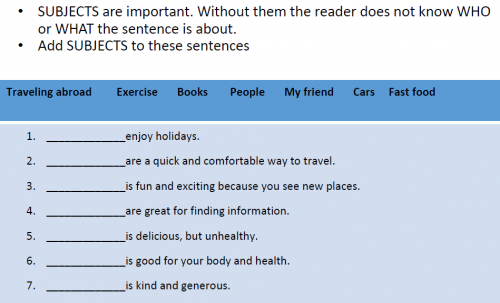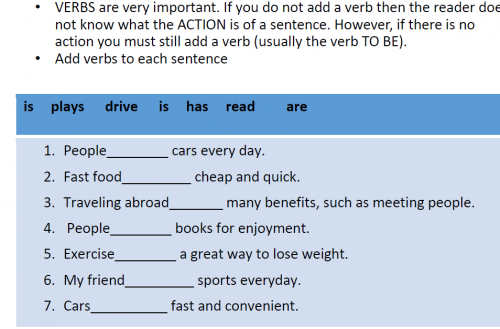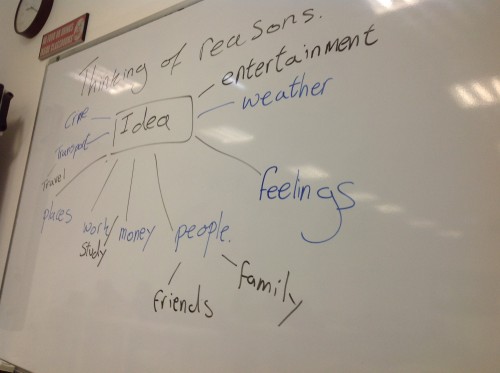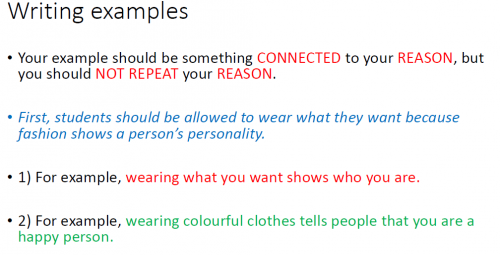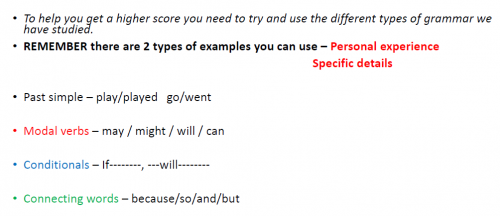Repeating Level 3 students: Developing their writing skills
Jonathan GelensIf you have a level 3 class that is repeating they may have already have gone through Gary Pathare’s “On the Road” booklet. This means that it will be a bit boring for them to have to go through it all over again. However, we can still help these students develop their writing skills. Below is an outline of things that I have found useful to do with my repeating level 3 students. Furthermore, some of these ideas I have expanded from my work with level 2 writing.
| Week 1 | Understanding the question |
| Week 2 | Subject and verb – sentence structure |
| Week 3 | Writing reasons – thinking of ideas |
| Week 4 | Writing examples – details and experiences |
| Week 5 | Using grammar – complex sentences |
| Week 6 | Review and practice |
Week 1
For the first week I focus on the question. For this I show them that the questions they are usually asked will have a ‘topic’ and 2 opinions. The topic may not be directly stated, but it is something that connects the 2 opinions together. To practice this we work together as a whole class looking at a few example questions. They then work in small groups looking at a variety of different questions. I have added a few worksheets, so if you would like to look at them or adapt them that is fine by me. Also in week 1 I will give the students a writing task to do. They must do this individually and within 45 minutes. From this I will discuss with them individually about their writing.
http://esl.fis.edu/grammar/seq/2.htm
Week 2
I have noticed that from the writing in week 1 that the general error that most students make is that they will always leave or forget the subject and/or the verb. So, I will spend some time working on subjects and verbs. I have found a useful website (I will give the link below) and my own worksheets and Bookwidgets as well as a Kahoot to help practice this. I usually begin by using one of Gary’s example essays and we can go through each sentence discussing the subject and verb. I find Gary’s examples extremely useful as they can guide students to what they need to achieve. We will then do another essay and I will have them focus on subjects and verbs for all their sentences.
http://esl.fis.edu/grammar/satz/subpred.htm
https://www.bookwidgets.com/play/WBMLZ8
Week 3
In weeks 3 I take the students back to the planning stage. Here we will focus on reasons. I find that students have some difficulty coming up with ideas for their reasons and while they are writing they can waste time by sitting and trying to come with up with something. So, I go over how to use ideas to make reasons. Again I use some of Gary’s example essays from the opinion toolbox and together as a class we look at the reasons and discuss what each reason is about. For example, “my first reason is that it is fun and exciting” – this is about feelings. Also, “They claim that going abroad is expensive” – this is about money. I will have them go through a worksheet with a question and different ideas. They then have to make reasons using a variety of ideas. Some of the ideas I use are – Friends, work, money, travel, feelings, etc. After we have practiced I will again give them another essay question to practice with.
Week 4
In week 3 we looked at reasons and ideas. In week 4 we will now look at examples. So, I like to think of reasons as a very general idea. The example then should be something specific about the reason. I give the students two choices. They can either write about a specific detail or they can talk about an experience. I prefer it if they can mix between the two. So, for specific details I tell them that they need to think of a real thing that is connected to the reason. For example, “Firstly, Pets can help people. For example, dogs are used to help blind people walk around”. Here the reason “help people” is very general. My example is about dogs only, but we could have said another animal such as horses for travel or camels for carrying things. When the students write about a personal experience, I tell them to talk about someone that they know. This could be a family member or a friend. However, they may need to use the past tense for this, so make sure that when you go through some examples with them you point this out.
Week 5
In week 5 I want my students to now start using some more complex grammar. How can we help them achieve a band 4.5 or even a band 5 without some complex grammar? In order to try and achieve this I go back to the reasons and examples. Here we look at how we can expand and develop either a reason sentence or an example sentence. I try to focus on the grammar they have been taught so far in the course. So, I look at modal verbs, relative clauses and the first conditional. I tell them that if they can demonstrate each of these sentence types they should be able to get 4.5. The first part to this is giving the students a very simple sentence, such as “pets help people”. From this they can then play with the sentence and see how they can develop the sentence using the different grammar. So we could change ‘pets help people’ to ‘pets can help people’ or ‘there are many pets which help people’ or ‘if you have a pet, it will help you’. I tend to find that it’s better to use simple grammar for the reasons and more complex grammar for the examples.
Week 6
In week 6 I prefer to review everything we have look at so far and give them some more practice. So, go over questions and planning, sentence structure, reasons, examples and grammar. Give them some essays to practice with and go over their good and bad points.
I have done this a few times and it has helped. This is something that I have found to useful and at least I am not having to go over the same material with my students. I can adapt Gary’s booklet and I can make a new Bookwidget with different examples and questions. However, I keep the structure the same and try to give the students as much help, advice and practice as I can.
